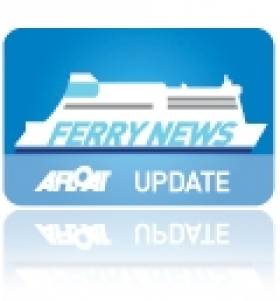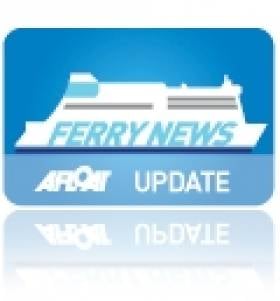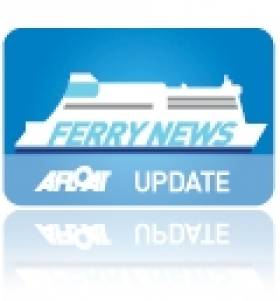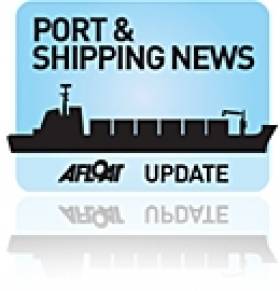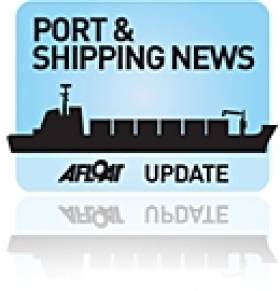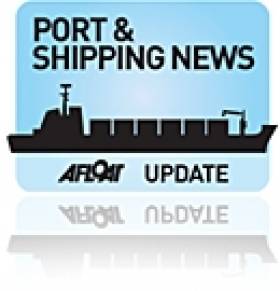Displaying items by tag: Fastnet Line
Anniversary Sailing Bound for the Rugby
West Cork Tourism Co-Op launched the company a year ago as a result of a successful campaign to restore the direct service between Wales and the southern Ireland. Many businesses from the region and their Welsh counterparts invested in the co-op to restore the link since the closure by Swansea Cork Ferries in 2006.
Fastnet Line will continue to be in a celebratory mode with the first outbound sailing from Cork on Friday and which will also cater for a special-rugby supporters trip for this weekend's Six Nations Championship between Ireland and Wales at the Millenium Stadium, Cardiff. The Friday sailing departs Cork at 20.30hrs and arrives at 08.00hrs in Swansea on the Saturday morning with the game kicking off at 17.00hrs (5pm).
The company are offering various foot passenger deals to the match. A return bus transfer is also available between the ferry terminal and the game venue (but at an extra cost). In addition there are deals for those wanting to take the car. The after match sailing departs at 23.50 with the ferry arriving back in Cork at 12.00 noon on Sunday 13 March. For further information on fares etc click here
‘Proposed’ Cork-Spain Route Remains Under Review
In addition to services running out of Rosslare operated by Celtic Link Ferries and Irish Ferries and the alternative option of landbridge connections to Europe via the UK.
In the meantime, the Port of Cork will continue to be in dialogue with potential operators and investor's, however in the current climate it is proving more challenging to establish the service. Yet both the port authorities in Cork and Gijon remain committed in establishing the first direct Irish-Iberia passenger ferry route, with an update on the Spanish service due in early June.
Since 2008 the port authorities of Cork and Gijón, through the Promotion of Short Sea Shipping and Co-Operation with Small Medium Enterprise's (Proppose) an EU Inter-Reg project, have conducted feasibility studies into the service.
Interest in the service to date, has shown interest from Brittany Ferries, P&O Ferries and Transfennica, a Scandinavian based operator. It was envisaged that a ro-pax type of vessel would operate the 24-hour route to Gijón in Asturias, the region which forms part of Spain's northern 'Green' coast.
The route across the Bay of Biscay would be an attraction to freight hauliers, saving mileage and reduced fuel costs in addition avoiding a weekend ban to trucks travelling through France.
Last summer the ro-pax Norman Bridge started a new route between Nantes / St. Nazaire (Montoir-de-Bretagne) and Gijón, operated by GLD Atlantique. This route received support through the EU 'Motorways of the Seas' (MOS) programme to divert vehicle traffic from congested road-infrastructure and transferred to designated shipping routes, using larger and faster ro-pax vessels.
The route's opening was marked with a declaration signed by Dominique Bussereau, the French Minister of State responsible for Transport and his Spanish counterpart Magdalena Alvarez of the first of two Franco-Spanish MOS concept routes, starting with the 14-hour GLD Atlantique service.
- Irish Ferries
- port of Cork
- Celtic Link Ferries
- Fastnet Line
- P&O Ferries
- Brittany Ferries
- Ports and Shipping News
- Cork Harbour News
- RoPax
- Port of Gijón
- Proppose
- Motorways of the Seas
- MOS
- Transfennica
- CorkGijón
- Asturias
- 'Green'Spain
- Landbridge
- NantesSt.Nazaire
- GLD Atlantique
- Norman Bridge
- Cork Harbour
Amendment to Fastnet Line Ferry Schedule
Reservations Office Ireland : +353 (0) 21 4378892
Open Monday - Friday 9.00 am - 5.30 pm
Reservations Office UK: 0844 576 8831
Open Monday - Thursday 8.00 am - 8.00 pm
Open Friday 8.00 am - 7.00 pm
Open Saturday and Sunday 9.00 am - 6.00pm
Fastnet Line Cancel Tonight's Sailing
Operators of the Cork-Swansea route, Fastnet Line regret to announce that tonight's (13 January) sailing from Cork to Swansea is cancelled. The company has cited technical reasons for the cancellation of the sailing. The 10-hour route linking Munster with South Wales is served by the M.V. Julia.
Fastnet Line are contacting all passengers to assist in making re-bookings or refunds. Those wishing to contact the ferry operators' reservation team for further information can contact the details listed below.
The Julia is to go into dry-dock this week in Swansea. The vessel will remain in Swansea while undergoing annual maintenance up to and including Wednesday 9th February. Her first sailing will be at 20.30hrs from Swansea to Cork on Wednesday 9th February 2011.
To contact the Fastnet Line Irish Reservations Office Tel: +353 (0) 21 4378892 (Open Monday – Friday) 9.00 am - 6.00 pm
To contact the UK Reservations Office Tel: 0844 576 8831
(Open Monday – Thursday) 8.00 am - 8.00 pm
(Open Friday) 8.00 am - 7.00 pm
(Open Saturday and Sunday) 9.00 am - 6.00pm
For further information logon to www.fastnetline.com
Fastnet Ferry Figures Smash 2010 Target
The passenger figure represents four-times the capacity of the Liberty Stadium, Swansea which is to host the rugby Heineken Cup clash between Swansea Neath Ospreys and Munster on Saturday 18 December.
The 10-hour ferry service operated by Fastnet Line also carried 31,000 vehicles and statistics suggest a significant boost for the Swansea Bay economy with about 40% of all passengers so far travelling from Cork to the south Wales region. The route is served by the MV Julia which had been sailing in the Baltic. The 1982 built vessel is capable of carrying more than 1,800 passengers and 400 cars.
Fastnet Line will run all-year-round in 2011 and has set a revised target of 120,000 passengers.
On a seasonal note, Christmas gift vouchers are available from Fastnet Line, for more information logon HERE
Ferry Special 'Munster Rugby' Sailings
After the match supporters can take the bus from Swansea city centre to the ferryport, with departures on the hour at 19.00, 20.00 and 21.00hrs. Passengers check-in times at the terminal are from 19.00hrs and up to 2200hrs. The return sailing departs at 2350hrs on Saturday 18 December and arrives into Cork at 1400hrs on Sunday 19 December.
For information on prices contact Fastnet Line Tel: (021) 4378892 or logon to www.fastnetline.com
Ferry Passenger Boost Recorded for First Half of 2010
The figures reflect the disruption to the aviation industry due to the ash-cloud that erupted from the Icelandic Eyjafjallajokull volcanic mountain in April. This contributed to a large volume in passengers making alternative travel plans by booking with ferry operators.
During the week of the main closure to European air-space, ferry operators noted a three-fold increase in the demand for foot-passenger bookings throughout the main Irish Sea routes. The IMDO estimate that an additional 106,000 passengers took the ferry option compared to the same time period in 2009.
On the continental routes between Ireland to France, volumes increased 25% in the second quarter of 2010. There are three routes operated by four ferry operators. Over 30% of the passenger market is conducted within the second quarter of 2010, marking the beginning of the tourist season. Therefore any increase in passengers volumes from this time is likely to have a positive impact for the balance of the full year figures.
In the months between March to May, the increase in sea-passengers was up 14% year-on-year. While the market demand on English Channel routes, which accounts for 90% of the traffic, saw passenger numbers surge 13% in the second quarter of 2010 compared to the same timeframe of the previous year.
The largest percentage increase in traffic, was recorded at Dublin Port, during the first 6 months of 2010, where passenger volumes rose by 25%. Earlier in the year, a new entrant into the Irish Sea market, Fastnet Line re-opened the Cork-Swansea route. In 2006 the 10-hour route was closed by Swansea Cork Ferries. The new operator provides 6 sailings weekly which are likely to have resulted in a boost to passenger tourist vehicles in the south-west region.
On an all-Ireland basis there are 5 operators operating between Ireland and the UK, and 2 operators between Ireland and France providing 60 daily sailings. Irish Sea operators are Stena Line, Irish Ferries, P&O (Irish Sea), Seatruck Ferries and DFDS Seaways (formerly trading as Norfolkline) until acquired by the Danish ferry and transport logistics company. On the continental services, Irish Ferries and Celtic Link Ferries operate out of Rosslare Europort while Brittany Ferries serves the Cork-Roscoff route.
For a detailed PDF of the figures please click attachment listed below. For further information about the IMDO logon to their website: www.imdo.ie
Fastnet Line Exceed Expectations
Fastnet Line recorded carrying over 60,000 passengers up to the end of August since the Cork-Swansea route re-opened in March, served by the 21,699 tonnes M.V. Julia, writes Jehan Ashmore.
Commenting on the inaugural season, Paul O'Brien, general manager of Fastnet Line said figures were ahead in June, July and August by an average of 10%. Over 13,000 passengers were carried during July and 15,000 in August on the 10-hour service.
Businesses in the south-west region have reported increased tourism activity and is it from here and in south Wales that many of the shareholders have invested to form the West Cork Tourism Co-operative, which runs Fastnet Line. In 2006, the previous operator of the route, Swansea-Cork Ferries closed the service after selling their vessel, the Superferry to interests abroad.
Marketshare between Ireland and UK passengers appears to be evenly split with the tourist gateway to south-west Ireland proving particularly
popular with Londoners reaching Swansea using the M4 motorway. Motorists can save over 600km /370 miles on the direct round trip compared to alternative ferry routes between Rosslare and Pembrokeshire ports.
During the first two months of operation, booking revenues were in excess of £3m (sterling) alone, with over 15,000 passengers using the 1,860 capacity and freight-ferry, Julia. Unsurprisingly there was a 100% boost in April bookings arising from travel disruption caused by the Icelandic volvanic ash-cloud.
The year-round overnight service operated eight sailings weekly in the high season and is now down to six. Notably there are no Monday sailings as Julia spends a lay-over period at the Ringaskiddy ferry terminal in Cork.
The freight market will continue to be important factor during the offseason with the British Bermuda flagged Julia capable of loading 40 trucks or trailers. As for passengers, Fastnet are promoting short-break and mini-cruise offers only on sailings up to December 21st.


























